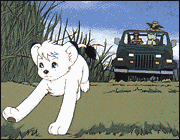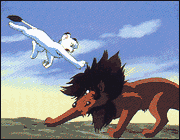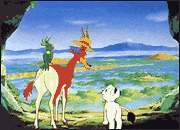

Copyright © 1989, 1998 Gakken * Nihon Keizaisha * Tezuka Productions * TV Tokyo



|
 |


—by Charles McCarter
KIMBA THE WHITE LION exists in several incarnations in its native Japan, and
now it does in the United States as well. The series that aired on American
television some twenty-five years ago can be found on video, and the 1996
theatrical movie has been licensed by Media Blasters for American release.
However, somewhere along the line, Pioneer managed to sneak in and get the
late 1980's remake of the original series and is releasing it under the
banner of "Pioneer Family Entertainment."
 The story on this first tape deals with the legend of the white lion, Panja,
who happens to be Kimba's father. Some poachers are interested in capturing
the white lion, as it will be a great prize. The natives warn that he is
the protector of the jungle and will not be so easily captured, but to no
avail. The poachers kidnap his wife, and Panja goes to rescue her. In the
ensuing chaos, he is mortally wounded. The story on this first tape deals with the legend of the white lion, Panja,
who happens to be Kimba's father. Some poachers are interested in capturing
the white lion, as it will be a great prize. The natives warn that he is
the protector of the jungle and will not be so easily captured, but to no
avail. The poachers kidnap his wife, and Panja goes to rescue her. In the
ensuing chaos, he is mortally wounded.
 Kimba is born on a steamship headed out of Africa, but his mother helps him
escape, telling him he must return to his home to take up where his father
left off. This is truly the beginning of Kimba's journey as he must find
his way home by negotiating through a series of trials, tricks, and traps
that the world has in store for an unsuspecting and nave young lion. Of
course, on the way, there will be both enemies and allies, and determining
which is which is not always an easy task. Kimba is born on a steamship headed out of Africa, but his mother helps him
escape, telling him he must return to his home to take up where his father
left off. This is truly the beginning of Kimba's journey as he must find
his way home by negotiating through a series of trials, tricks, and traps
that the world has in store for an unsuspecting and nave young lion. Of
course, on the way, there will be both enemies and allies, and determining
which is which is not always an easy task.
 While the technical quality of the animation has improved, this production
retains the classic Tezuka look that might be described as "cartoony."
However, since we are dealing with talking lions and other wildlife, the
look fits the show, and it also reflects the youthful innocence with which
Kimba views the world. While the technical quality of the animation has improved, this production
retains the classic Tezuka look that might be described as "cartoony."
However, since we are dealing with talking lions and other wildlife, the
look fits the show, and it also reflects the youthful innocence with which
Kimba views the world.
 Since it is based on the original series, the plot in this version of Kimba
is essentially no different than it was before. As a result, the story is
still a simple one, and certainly not riveting. However, Tezuka's gift was
to take these simple stories and make them something more; this video tries
to follow in that vein, remaining true to the story but trying not to appear
too dated or nostalgic. Since it is based on the original series, the plot in this version of Kimba
is essentially no different than it was before. As a result, the story is
still a simple one, and certainly not riveting. However, Tezuka's gift was
to take these simple stories and make them something more; this video tries
to follow in that vein, remaining true to the story but trying not to appear
too dated or nostalgic.
 Yet it is because of the simplicity and the nostalgia that this show
succeeds in reaching a multigenerational audience. Those who enjoy the other
works of Tezuka Osamu will enjoy this show, and people who grew up watching
the first USA version of Kimba will likely find this a worthy retelling of
the tale. Children, too, will probably find this title very appealing for
its bright colors, cute characters, and exciting story. One caveat,
however: anime fans who think that anime only began in the late 1980's will
probably not find much to roar
about. Yet it is because of the simplicity and the nostalgia that this show
succeeds in reaching a multigenerational audience. Those who enjoy the other
works of Tezuka Osamu will enjoy this show, and people who grew up watching
the first USA version of Kimba will likely find this a worthy retelling of
the tale. Children, too, will probably find this title very appealing for
its bright colors, cute characters, and exciting story. One caveat,
however: anime fans who think that anime only began in the late 1980's will
probably not find much to roar
about. 
Released by Pioneer
English dialogue
65 minutes
PIKB-001D
$19.95
Available Now
Where to buy |


